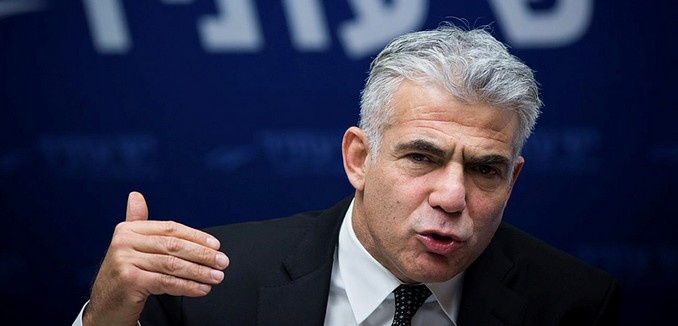Israeli opposition politician and Yesh Atid party chairman Yair Lapid said that the nuclear deal with Iran will fund the next war that the Islamic Republic’s proxies will wage against Israel, The Jerusalem Post reported Tuesday.
“Secretary of State [John] Kerry said himself last week that some of the sanctions relief will go to funding terrorism,” Lapid told reporters. “For us, this is not theoretical. This money will translate itself to rockets aimed at our children. The next conflict in the North or South of Israel is just a matter of time.”
Lapid said there were currently around 1,000 people digging terrorist tunnels in the Gaza Strip, some of them under the border and into Israel.
“The provocations, the breaches of international law, the preparations – are already happening every day by Hamas in the south and Hezbollah in the north, both with Iranian backing,” Lapid said. “When the next round of fighting breaks out, the analysis and the reporting shouldn’t start with the first Israeli strike, but with what’s happening on the ground right now.”
Phillip Smyth, an adjunct fellow at the Washington Institute for Near East Policy, wrote last year that Hezbollah’s increased activity on the Golan Heights was part of Iran’s strategy to militarily “encircle” Israel.
While the Jan. 18 attack represents another saga in the long-running war between Israel and Hezbollah, it also underlines a strategic power shift between Iran and the Assad regime. Hezbollah’s success in opening a new front in the Golan has been a major accomplishment. With greater access to the Golan — or at least sections of it — Hezbollah has a new, non-Lebanese zone it can utilize to target Israel. This may have been Hezbollah’s primary goal all along. Long before Syria’s brutal civil war, it was Hafez and Bashar al-Assad who used Lebanon, and often Hezbollah, as a front to exact their military goals against Israel. Now the tables have turned, and it is Hezbollah and its masters in Tehran who can choose areas of Syria to use against Israel.
For Iran and its Hezbollah proxy, this success is a step in a process to militarily encircle the Israelis. Tehran is currently re-solidifying its relationship with Hamas in Gaza, addressing a push for a southern front against Jerusalem. If needed, the Golan’s near-anarchic conditions also provide Hezbollah with plausible deniability (in the odd case it wishes to deny it had a role in attacking the Jewish state). Geographically, the domination of the Golan potentially creates a Hezbollah-dominated zone stretching from the Mediterranean to the Jordanian border.
Shortly before the nuclear deal was announced last summer, Hamas and Hezbollah officials met with leaders from Iran’s Islamic Revolutionary Guard Corps in a bid to further strengthen ties. Iranian Foreign Minister Mohammad Javad Zarif met with Hezbollah chief Hassan Nasrallah in August, telling him that the nuclear agreement presented them with a “historic opportunity” to confront Israel.
In September, Iran’s Defense Minister Hossein Dehghan affirmed that his country was committed to arming Hamas and Hezbollah. It was reported later that month that Iran boosted its funding of both terror groups in anticipation of the windfall it would receive through sanctions relief.
[Photo: Yonatan Sindel / Flash90 ]




